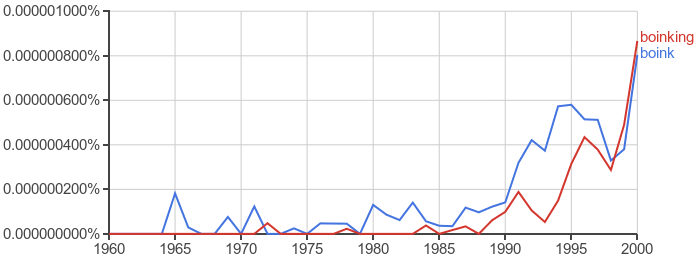The OED dates boink as a verb back to 1984, citing Stephen King's Thinner, where it appears to be used as onomatopoeia, similar to bonk:
He half-expected them to begin bopping and boinking each other.
For this sense, the OED gives the definition "to strike, to knock", which is fairly similar to how bonk is used. As for the sexual meaning, their earliest cite is from two years later, a 1986 posting to the newsgroup net.singles by Andrew Tannenbaum:
When you and your honey boink away, you're doing what the doggies do.
Can boink be antedated? Perhaps. But take a look at the following chart from Google Books Ngrams Viewer:

So at the very least, boink wasn't widespread until after the mid-80s.
Searching Google Books, I was able to find some examples of boink from before 1986, but none with a sexual meaning. I chose to search for boinking first to reduce false positives because Google Books (unlike their Ngram Viewer) is case-insensitive and Boink is a name. I did also search for boink, but it was less useful. Searches for boinked and boinks had fewer false positives than boink did, but neither turned up any pre-1986 citations with a sexual meaning.
Most of what I found was like the following snippet from The Complaint Booth (Jack Kurtz, 1978):
Fairies pass through audience boinking people with their wands. Elves up and down aisles "beeping."
Here it seems similar to bonk. And we can find scattered earlier uses with the same meaning, as in the following 1966 use with a similar meaning in Science & Technology:
This causes a mechanical wave to travel around the circumference of the sleeve―in the same way it would if you kept "boinking" the top of a metal can with your fingers.
Using the same tools, FrankFrank found an even earlier example, apparently quoting something Senator John Thye said in a 1947 congressional committee meeting:
Mr. Sears, how would you propose to perfect the general farm program, disregarding soil conservation which is just one small phase of the enter program, but boink back to parity price, the ever-normal granary, and those programs?
There are more like this, but it didn't seem to be especially common and none of the pre-1986 examples I found had a sexual meaning. Of course, that doesn't mean people didn't use it that way, only that I can't find it in print using online tools. It seems likely that the word was used in speech before it appeared in print, but I can only speculate as to how much earlier.
Given the dates, including the citation Frank found, it seems reasonable to guess that boink goes back about as far as bonk. As for the sexual use, it seems safe to say it became commonplace after the mid-80s.
